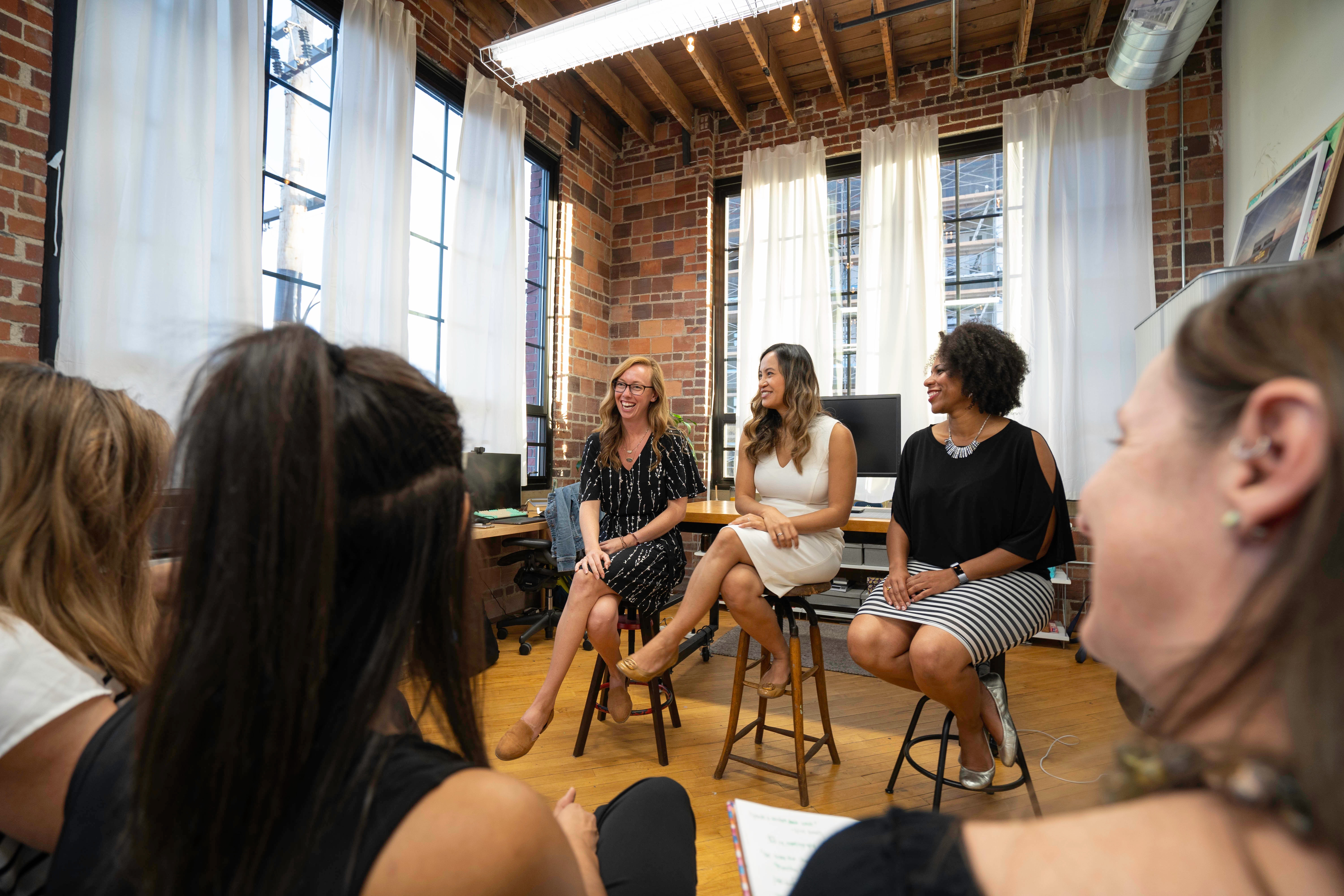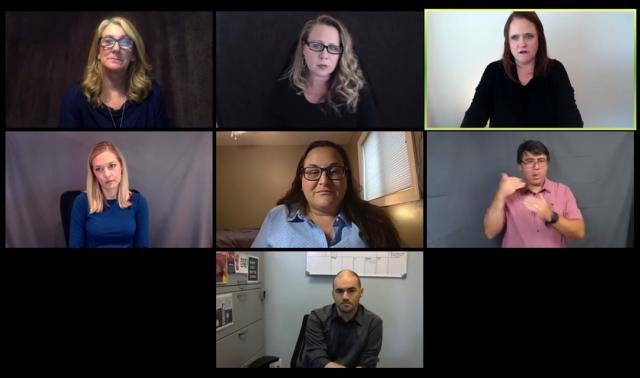Read the full video description.
During the COVID-19 pandemic, finding ways to connect with students has been even more of a challenge for disability services professionals, educators, and administrators. Additionally, the dramatic shift in education and social interactions has left many deaf students feeling forgotten or isolated.
The National Deaf Center on Postsecondary Outcomes (NDC) had these challenges in mind when they hosted Persevering Through Uncertainty: Stories from Deaf Students, a live online discussion featuring a diverse panel of deaf students attending a variety of universities, technical schools and colleges.
The panelists gave professionals and educators the opportunity to learn directly from deaf students, who shared their experiences navigating online classes, managing accommodations, and dealing with stress.
The panelists were:
- Isabelle Candanosa, who is studying hearing sciences at the University of Texas at Austin.
- Natasha Sookram, who is studying criminal justice at Palm Beach State College.
- Jules Good, a graduate student in public policy at the University of New Hampshire.
- Tristan Bollig, who studied visual communication and audio at Madison Area Technical College.
New Technology Means New Challenges
Online classes, which many times lack captions or other accessibility features even during the best of times, became a serious hurdle for deaf students during the pandemic. Schools and educators unused to the technology, overwhelmed IT departments, and last-minute changes often left deaf students feeling unable to keep up.
“I had to have patience,” said Bollig. “A lot of the information was just put online in audio files. The professor would just record it, upload it, and share with the students. They had immediate access. But that left me out.”
Bollig pointed out that his delay in access often put him behind his peers.
“The professor didn’t include any captions, so I had to wait a couple days, maybe three days or more, depending on the schedule. And that was just to figure out what was said, what was due, what type of project I was working on.”
Good also had issues with access to audio online.
“There were a couple of times where the audio quality coming from the professor was so bad that the captions weren’t picking it up, so I would use VRS and an interpreter. I basically spent the first 20 minutes of a class trying to get my access needs to be set up, and I’m missing all of this information in the meantime,” Good said. “It was super frustrating.”
Sookram shared this frustration, saying, “When the professor would speak, I couldn’t see anything like with an interpreter, and that was quite frustrating. I asked how I could at least see the professor, and they told me that it was an audio-based system.”
Yet even the proposed solutions to these challenges were not always effective.
“I made a complaint to the DSS office, and they provided me with two platforms, Zoom and the blackboard platform,” she added. “It was still difficult because I had to split my attention between the screens showing both platforms.”
The unpredictability of education in the time of COVID-19 also challenged these students.
“Sometimes a professor would just schedule something at a moment’s notice. I didn’t have time to schedule an interpreter,” Candanosa said. “I didn’t have the two or three-days that was what they often require to get an interpreter, so I would have to call VRS myself. It wasn’t always the best.”
Supporting Deaf Students Requires Institutional Commitment
Deaf students have learned that they must advocate for themselves, often breaking new ground at a school or with a professor that has never interacted with deaf people. That’s why it is vital for personnel across campus — including disability services professionals, teachers, and administrators — to know how to best support deaf students.
“Some of my professors never really understood why I needed captioning or why I needed some flexibility with my due dates and assignments,” said Candanosa. “So, for me, the disability services offices were wonderful in bridging that gap.”
Sookram agreed about the importance of institutional buy-in.
“I’ve had a consistent interpreter for classes, but then when it came time to give a presentation, I had to make sure that I had the interpreter ready. I prepped them with my notes and let them know what I was going to be presenting on so when I presented they were on point and matched my presentation.”
Collaborative relationships with interpreters are enabled by engaged disability services offices and can significantly improve the student experience. Institutional commitment must also be present, however, to support the use of those accommodations in a student’s day-to-day life. For example, professors also need to be familiar with the impact of accommodations on student experiences.
“I’m fortunate that my professor was extremely flexible and understood that it wasn’t equitable, that hearing people don’t have to rely on an interpreter to give a presentation,” she said. “I was able to come together with them and discuss how my grading would not be based on the interpreter, but on me.”
Good stressed the importance of also having flexibility and institutional support when working to get the accommodations you need.
“I think that disability offices can forget how difficult it can be for people to access accommodations, even in normal times. Sometimes you have to go see a specialist to get a specific diagnosis to qualify,” they pointed out. “For people who are uninsured or who aren’t as financially stable, especially during uncertain economic times, it can be really difficult to have to go through that process.”
Good added that this financial inequity can affect access.
“I feel that they’re probably a lot of students who aren’t getting the accommodations they need because they are afraid to go through that process, or they’re unable to go through that process,” they said. “I hope that disability offices are less stringent about that, especially in the midst of a global pandemic.”
#DeafSuccess Takes Everyone
While many students struggled to adjust during the pandemic, deaf students faced additional challenges to accessibility, services, and resources. As schools reopen and in-person classes resume, schools need to support deaf students in this transition.
Cardonza raised the vital issue of deaf mental health.
“Deaf people, we need more than just physical support, right? Or for me, auditory support,” she pointed out. “We need mental health support. This kind of work is exhausting and can impact your mental and emotional health.”
The barriers and stress can feel insurmountable for deaf students sometimes.
“I think sometimes people just don’t expect deaf people to succeed and to do well,” Cardonza continued. “They just don’t set up the system to help us succeed. They just assume, ‘they can’t do it anyway. So why bother?’ But if they don’t set up the system in a way to help us, then obviously we’re not going to succeed. It’s just a cycle.”
Bollig pointed out that deaf students often have to push for the support they need to break that cycle.
“You’re not in a position where you have to take what’s being shelled out at you. You have rights, and you need to stand up for them,” he said. “If you feel you’re not being treated fairly, go ahead and use whatever procedure is in place.”
Breaking the cycle also requires work from educators and institutions.
“Every individual is different in the type of accommodation they need. There’s no one size fits all,” Bollig continued. “You need to make sure that the individual, regardless of if they’re online or in a physical class, has the accommodation that is a good fit for them.”
Good agreed on the need for proactive action from educators and disability services professionals.
“If you’re a DSS professional or a professor, you should be seeking each other out in your university settings,” they said. “Sometimes the only interaction that professors have with the DSS office is reading a letter that they send on a student’s behalf that says you have to do this because of the ADA. And sometimes professors assume that you’re trying to take advantage of the system, or you’re trying to do something to make it easier on yourself. Which is not true.”
Good suggested educating professors about accommodations and student needs.
“Further explanations from DSS of what goes along with the accommodation, like why it matters to Deaf culture or the mental health challenges that are unique that can come with having a disability, can help educate a professor,” Good continued. “I think that there needs to be more collaboration between those two groups, and just more understanding.”
That understanding can be the catalyst for deaf success.
“All we’re looking for is equality and the same opportunity to get the same quality of education as our hearing peers,” Good said.
Resources from NDC
To learn more, check out future online events and presentations this summer. Deaf Student Access: Tips & Resources for Reopening Campus, will be a live presentation on June 24 covering the most frequently asked questions about access and accommodations in a variety of formats.
NDC has hundreds of other free resources available. Sign up for NDC’s newsletter and listserv to stay updated on new events, resources, and classes. Contact NDC | help for additional questions or make an appointment with one of our specialists.









